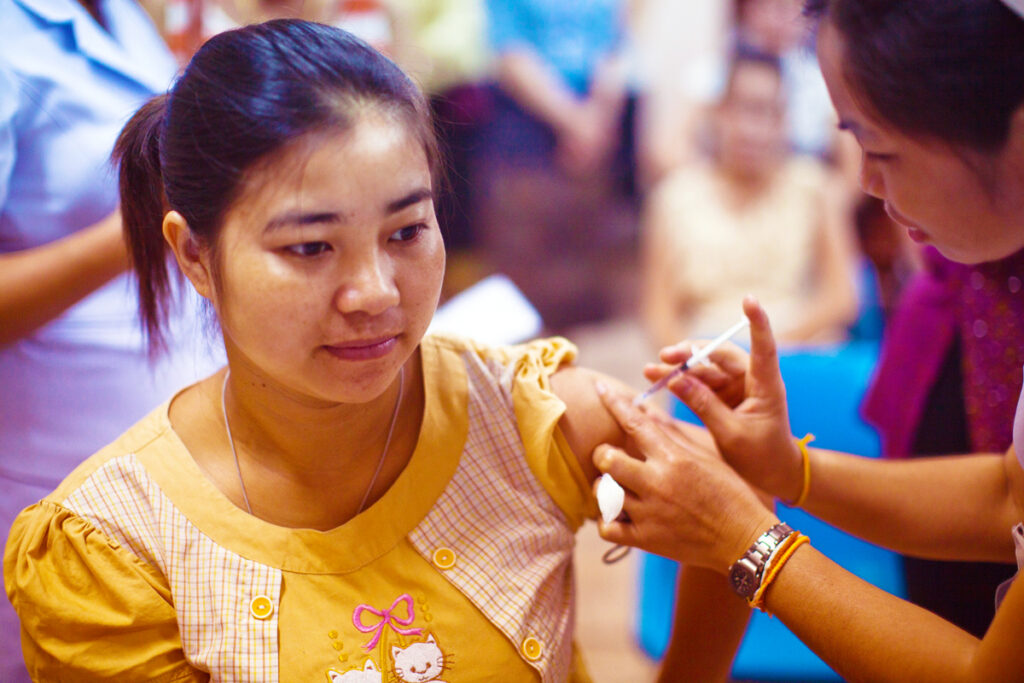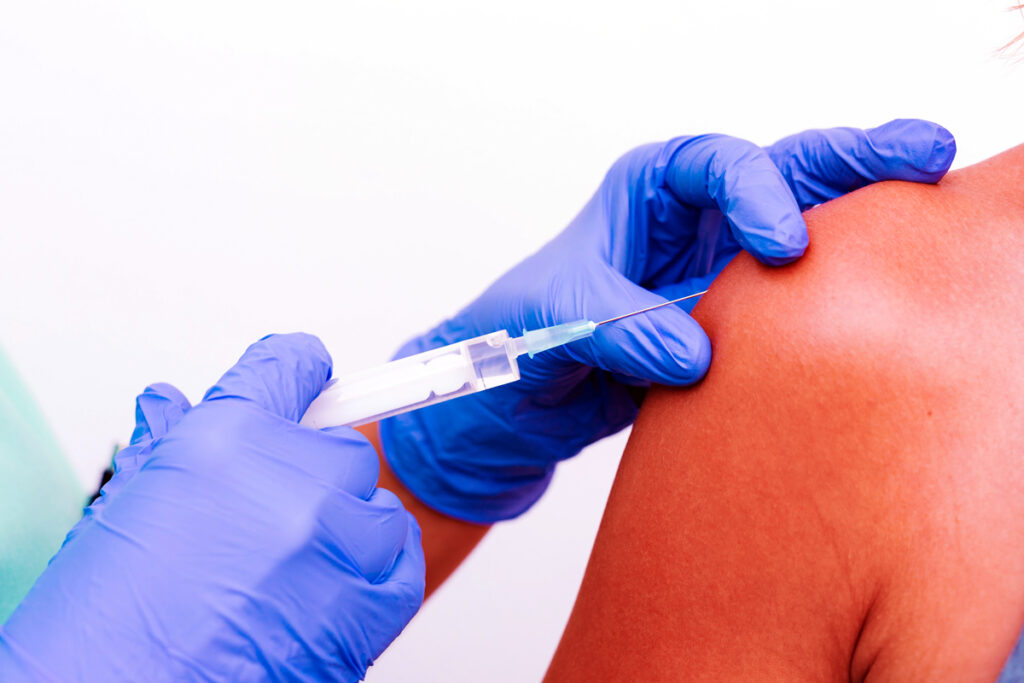Coronavirus can make people sick, drive them to the hospital or even kill them. And children are no exception to the rule. While we finished with adult inoculation first since the roll-out of the earliest set of vaccines in 2020, which included grandparents and parents, the unvaccinated children remained at the risk of becoming a victim of the third wave, Omicron, and Deltacron.
And, amidst all the clamor on the safety, side-effects, and efficacy of the vaccine on the kids, the American Academy of Pediatrics approved the vaccination program, admitting that immunization is important for children because, in the US, hospitalization rates of Covid-affected children were the highest. According to reliable data, nearly 9.5 million children have been affected by the virus, representing 17.8 percent of the total cases since its onset. As such, vaccination is justified, for it will not just help prevent children from falling sick from the infection, but might also keep them more active intellectually and communally so that they can resume regular schooling and activities.

Agreeing to the urgency, the US Food and Drug Administration and Centres for Disease Control and Prevention immediately approved, elicited, and started to administer the vaccine for children of ages 12 through 15 during the summer of 2021, and for the rest, through 17 years, got the jabs in the following season. Pfizer was recently approved for children aged 5-11, and those below 5 years are next in the line. However, in this article, we are concerned about the vaccination of kids between the ages of 5-11 years since it is coming to them after a lot of thought, given the tender years of their life. This age group is ‘Currently’ getting vaccinated in America. And, close to the idiom, motherhood, apple pie, and the flag, the pattern is being followed by most the countries as well
Whilst in Canada, the scene is bleak as it still juggles with the thought of sloping it fully. Since the country is a bit strict in rolling out their vaccination program and until they are fully satisfied with the clinical trials, their slow pace seems justified. Recent data from the Public Health Agency of Canada, reveals only 3.2 percent of children the ages ranging from 5 to 11 have been fully vaccinated by the 8th of January; a figure lower than in other countries while those between the ages 12 and 17 reflected 82.77 percentage. And, for children between 6 months to 4 years, clinical trial results are expected by the end of 2022.
Coming to France now, it stayed close on the heels with America, having gotten the ball rolling around the same time in the summer of 2021, having done with children aged between 12 and 17 in this period; nearly 79.4 percent have been fully vaccinated since then, and December saw them through their first batch of the corona vials for the ages 5 through 11; yet, it is a bit slow here with only 2.1 percent of the kids having been vaccinated so far. But, despite the trend, the country doesn’t make it compulsory for the kids, allowing their parents the liberty to make a decision.
And in India, there is still time to take off, walking at a snail’s pace in comparison, having started its vaccination drive for children between the ages of 15-18 years on 3rd January this year. The next batch of ages 12 through 14 is expected by March. And this will be followed by the ages 5-11 and further down probably as it has yet to clear these age groups for vaccination.
While, in the UK, the announcement of covid shots for ages 12 through 15 was done in September last year. But only 21 percent of the fully vaccinated children were reported, and the adult vaccinated percentage remained at 81. The focus of this article is 3,30 000 children in the 5-11 age group, that have started to get vaccinated since December, last year.
Besides the just mentioned, Spain and Italy have also made it to the long repertoire while Israel, Oman, Saudi Arabia, Bahrain, and UAE have given the nod to kick-start the vaccination drive in their respective countries, anytime.
Vaccination is in full swing everywhere. Here, looking at the 5 important pointers now that make immunization a safe bet for children in ages 5 through 11 despite all the apprehensions; let’s take a leaf from the scenario given earlier in America, as other countries follow suit to understand why vaccinating children is not a bad idea.

First of all, let’s give a thought to why kids need to be vaccinated at all
Given that kids are equally susceptible to coronavirus as their adult counterparts, vaccination can save them from getting sick, hospitalized, and dead. Moreover, since the vaccine dosage has been prescribed according to their constitution, reducing it to only 1/3rd of the vaccine given to adults, it is kid-friendly and safe to take.
Secondly, since, no data have been found to suggest any serious side effects so far, at least in America, it is presumed to be safe for children. At the most, they might experience temporary pain in the area of the injected upper arm, mild fever, chills and body pain, and nothing more than that. Moreover, these upshots can be treated with regular, OTC medications at home, hence, there is nothing to worry about.
Third, the vaccine doesn’t stay in the body for too long, making it unlikely to affect puberty or reproductive organs of the vaccinated children, hence, one can rest assured that there will be no serious implications for the procreative organs in the long run.
Last but not the least, further cooperating with the citizens, America has eased up the mandate and parents can take respite in the fact that health insurance is not mandatory for those keen on the jab, nor is American citizenship. It is open to children of color, brown and caucasian equally. And immunization is available right at your doorstep, literally speaking. Scout nearby churches, community sites, schools, clinics, hospitals, etc. You will stumble upon some likely options at a hop, skip, and jump distance.
Once you have made up your mind, the next big problem will be to convince your child of the jab, and taking into account the sensitive mind and physique of a kid, it is not going to be a cakewalk. But, with little grounding, children can be prepared well in advance.
A senior expert, Christie Chambers, Ph.D., professor in the Department of Psychology and Neuroscience and Pediatrics at Dalhousie University in Halifax, Nova Scotia, Canada, in a bid to help the anxious parents, advises that the fear of the needle can be tackled by categorizing them appropriately into three segments- Physical, Psychological and Pharmacological so that each one can be handled fittingly.
Beginning with physical pain management, she explains that sitting upright instead of lying to reduce pain in the area of the injection, hardening the muscles like a robot before the jab, and then releasing the muscles like spaghetti can help reduce the shooting pain of the needle.
As she comes to psychological pain management next, according to her, a child should be distracted at the time of the jab, taught to relax, and helped with breathing techniques so that their minds are diverted at the time of taking the jab. Thus, they will, at the least feel the pinch, both literally and figuratively.
She closes with the pharmacological pain management routine, which is last but not least. Topical creams and patches, which are easily available on the market can help numb the senses before or after the jab. One is free to choose the one that suits his little one. In hindsight, the techniques for pain management may be different for children of different ages. But preparing them well in advance can help reduce the fear of the pain of the needle.
Lastly, apart from pain management, we can also prepare their metabolism to get a more positive outcome from the jab. And since, there is no specific food recommended for children going for their vaccine, food high in nutrition especially vitamin C, like tomato soups, greens, lean meat, and citrus juices can help reduce upshots like inflammation and more. Make sure your child has tons of liquid to drink, like water, juice, etc. Apposite hydration, before and after vaccination will go a long way to ease the side effects like a mild fever, fatigue, chills, and body pain, similar to those of the adults. At the same time, it is best advised to avoid pain killers like ibuprofen or any other medication before the shot and to keep them only if symptoms show or persist after the shot. Downright, healthy, and highly nutritious food, especially anti-inflammatory and anti-oxidant will help a child bounce back to health faster.
Despite all the optimism, somewhere, down the line, we have forgotten a possibility, not much highlighted though, that athletics and sports-oriented children should not overstrain themselves physically right after the jab, and instead of the recommended rest of 2 days, extend it through a week at least. Taking a further 2 cents on this fact will be worth it. This is purely my observation of a person who got a stroke after taking to the gym for two days. If only he had waited for some more time, he would have avoided that stroke. The best thing to do would be to allow the booster to travel in the body at a normal pace without any kind of acceleration of physical activity to avoid strokes, Bell’s palsy, mild paralysis, etc.
Even though the children’s vaccination drive has seen a sharp rise everywhere, only about 1/3rd of parents are ready to get their kids vaccinated, fearing lack of enough proof of its safety after reading into the news that a marginal number of children have died after the shot. Further, in the northern German city of Cuxhaven itself, a 12-year-old boy died after the second shot of the BioNTech-Pfizer vaccine, even though the health experts refute this claim and suggest that vaccines cannot be the sole reason for his death after reading into his autopsy that he had a pre-existing heart condition. In another case, at least 3 out of the 5 children dying after the shot had pre-existing conditions. Unfortunate deaths are holding many parents back and they are waiting for some more proof to ensure the safety of the vaccine.
When experts were asked to give their opinion, they said the risk of severe outcomes can get augmented if children have underlying conditions like obesity, down syndrome, neurological disorders, multiple medical conditions, immunocompromising conditions, and conditions that need a lot of medical care. So, to avoid any such severity, the honesty of parents for the sake of ensuring the safety of their children will go a long way.
Well, interestingly all of the countries are not forcing the children to take the jab, respecting the feelings of individual parents and the anatomy of the children, while treating it as a matter of individual choice.
Conclusion: In America, an influx is being seen in the rate of hospitalization in the pediatric age group, ranging between 0 to 4 years. Since they are yet ineligible, their safety is a concern. Lactating mothers can perhaps come forward and continue breastfeeding over a longer period since the antibodies in the breast milk can pass on to the infants. While, still at it, the point to be noted is that Indian mothers have been found to breastfeed their children the longest; till 4 years! Others can learn from them, too. As other countries are still garnering the guts to vaccinate infants, countries like Argentina, Cuba, Venezuela, and Bahrain have already taken a bold decision to vaccinate children as young as 2 or 3 years. It is a matter of time before the rest of the countries will come around the bend.
Overall, the universal picture of vaccination for all age groups is optimistic. By this time, since, most of them have finished with the full vaccination, some have already begun with the third booster shot for the fully vaccinated.
We hope the coronavirus vaccination drive is successful to the extent of wiping out the last virus alive.
While closing on the article, here is a rundown on the countries that are already vaccinating their children or are about to roll it out, picked up from Mint, dated 26th December. Some data might have improved by today’s date.
- Canada (vaccinating children aged 5-11)
- The Philippines (vaccinating children aged 12-17)
- Thailand (vaccinating children aged 12-18)
- Spain (vaccinating children aged 5-11)
- New Zealand (expected to start in January 2022)
- Singapore (expected to start in January 2022)
- South Korea (vaccinating children above 12)
- Italy has approved vaccination for children aged 5-11.
- France vaccinates children between 5 to 11.
- Britain has recommended a second dose for 12 to 15.
- Hungary (vaccinating 16- to 18-year-olds in mid-May).
- Germany (expected to start vaccinating children under 12 from early 2022)
- Norway started offering single doses to children aged 12-15 in September.
- Bahrain has approved the Covid vaccine for children aged 3-11.
- Jordan, Morocco, Guinea, Namibia, and South Africa are vaccinating children above 12.
- Zimbabwe has approved the Covid vaccine for children above 14 years old
- South Korea, Australia, and the Philippines are vaccinating children 12 and over.
- Vietnam began vaccinating teenagers aged 16 and 17 in October.
- Cuba is administering vaccines to children as young as two.
- Venezuela is vaccinating children aged 2 to 11
- Argentina (vaccinating children as young as three)
- Chile (vaccinating children 6-11)
- El Salvador (vaccinating children 6-11)
- Costa Rica has made vaccination mandatory for children from age five.
- Brazil’s health regulator approved Pfizer’s vaccine for children above 12 in June.
- Columbia (vaccinating children above 12)
- Ecuador (vaccinating children above 6)
- Vietnam began vaccinating teenagers aged 15 and 17 in late October.
- Mexico reportedly started vaccinating 15-year-old.
Estonia, Denmark, Greece, Ireland, Lithuania, Sweden, and Finland are offering shots to children aged 12 and over, while Switzerland has approved vaccines for children above 12. Israel, Oman, Saudi Arabia, Bahrain, and UAE have approved Covid shots for children aged between 5-and 11.
Egypt authorized Pfizer’s vaccine for children aged 15-18 in early November. Weeks later, the country lowered the minimum age of eligibility to receive the two-shot vaccine in Egypt, from 15 to 12.

Dear Readers,
Vogue Wellness just kicked off as a health and wellness blog, striving to provide up-to-date and unbiased information and advice on Healthcare around the world that are of interest to its readers, and have wider political and economic implications. Your encouragement and constant feedback on how to improve our offerings will make our commitment to these efforts stronger. Even during these difficult times arising out of COVID-19, we continue to remain committed to you, keeping you informed and updated with Health and Wellness news around the world. We request you to stay at home and follow precautionary measures and government guidelines to save your life, and also those around you during these testing times.
We, however, have a request.
As we battle the economic impact of the pandemic, we need your support even more, so that we can continue to offer you more quality content. Our free subscription model has received an encouraging response from the readers, who have subscribed to our online blog. We expect more subscriptions to our online blog to achieve the set goals so that we can offer you better and more relevant content. We believe in fair and credible Content creation and publishing wisely. Your full support can help us take forward this blog experience with a guarantee of unbiased views/original content/up-to-date information to which we are committed.
Subscribe to Vogue Wellness-Where health thrives…If you like the content please do share.
Disclaimer: As a service to our readers, the Vogue Wellness portal provides access to our library of archived content. Please note the date of the last review or update on all articles. No content on this site, regardless of date, should ever be used as a substitute for direct medical advice from your doctor or other qualified clinicians.


